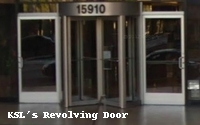Alleged Scheme To Defraud KSL Detailed
- by Steve McClellan @mp_mcclellan, September 15, 2013
 When KSL CEO Hank Cohen and president David Sklaver left the company in August, it was one of the first public signs that the 32-year old media shop -- which filed for bankruptcy last week -- had
big troubles.
When KSL CEO Hank Cohen and president David Sklaver left the company in August, it was one of the first public signs that the 32-year old media shop -- which filed for bankruptcy last week -- had
big troubles.
By then, however, efforts were already in the works to shutter the company. In fact, by June of this year, having been presented with information that the company’s restructuring efforts were unlikely to be successful, company founder Kal Liebowitz had decided to sell the assets of KSL and/or wind down the company’s operations, according to the firm’s bankruptcy petition.
But more than a month before filing Chapter 11 proceedings on Sept. 11, KSL filed a lawsuit in California against the former controller of the firm -- Geoffrey Charness -- and his wife Jennifer Charness, along with dozens of yet-to-be-named individuals and entities for allegedly stealing millions from KSL.
advertisement
advertisement
KSL claims that the alleged theft is a key reason that the firm has gone belly up.
According to the suit, filed on July 1, Charness set up unauthorized personal and corporate charge card and bank accounts through which he funneled $145 million from 2006 until he was terminated in 2010. Much of that money was used to pay KSL expenses, albeit using unauthorized accounting methods. But as of the time of the filing, KSL alleges Charness and his wife allegedly stole more than $2.5 million from the company.
KSL said in its suit that some of the diverted money was used to fund two side businesses that Charness had set up, including a golf equipment business and a car sales company -- and that he “used KSL’s funds to pay for purchases of golf equipment and automobiles and automobile parts.”
Charness and his wife also allegedly accrued some 145 million membership rewards points from unauthorized American Express accounts set up in their names. Jennifer Charness, KSL stressed, “was never employed by KSL” and used her unauthorized card to “make a number of personal purchases. Charness, however, failed to disclose any of these material facts to KSL,” the firm stated.
The suit didn’t delve deeply into how Charness was able to shift such large amounts of money to unauthorized accounts for years without being detected by accounting controls that are usually in place at most companies the size of KSL. The media agency had annual billings in recent years of between $250 million and $350 million, according to court filings. The firm did say a forensic accounting investigation was ongoing to determine the full extent of the alleged fraud and how it was perpetrated.
“As a high-level employee of KSL tasked with overseeing the integrity of all of KSL’s financial transactions, as well as the maintenance of its bank and credit accounts, Charness owed a duty to KSL to disclose any competing interests or important facts, including his use of KSL’s funds for his and his wife’s personal interests,” KSL asserted.
The company said that the former controller “made numerous false representations that he was engaging in his best efforts on behalf of KSL during his employment. In reality, during that time, Charness was simultaneously engaged in the theft and conversion of KSL’s funds and American Express rewards points for his own personal benefit.”
Charness wrote numerous unauthorized checks to himself totaling over $7 million in 2009 and 2010, drawing on KSL bank accounts, the company alleged. He did so by using a “facsimile stamp of the chairman of KSL’s name and signature.”
According to KSL, Charness’ fraud scheme began to unravel around June 2010 when the company hired a new CFO to whom he would report. “At that time, Charness began taking confidential documents belonging to KSL and booking several multimillion dollar journal entries into KSL’s accounting system.” Charness allegedly created “false journal entries,” and “deleted a great number of electronic files and emails from his work computer.” KSL alleged that activity to be “an effort to cover up his theft and conversion of KSL’s funds.”
Shortly after the arrival of the new CFO, Russell Dean, Charness requested and received a “medical leave of absence due to work-related stress.” A short time later, the CFO began to uncover accounting irregularities and launched a review of the company’s financial records.
Charness was terminated in August of 2010.
KSL’s complaint filed in the Superior Court of California for the Northwest District of Los Angeles did not mention an investigation into the matter by the FBI. That investigation was referenced in a declaration by Janet Miller-Allen, KSL’s current controller, who has been designated to oversee the winding down of KSL’s affairs. Miller-Allen described the FBI probe as an “active criminal investigation,” that KSL has been cooperating with.
Miller-Allen didn’t mention Dean by name, but said that the company’s “former chief financial officer” met with Agent Charles Koepke of the FBI on July 16 “to discuss the status of the investigation and ways in which KSL can further assist the FBI’s efforts.”
A spokeswoman for the FBI said she could neither confirm nor deny any investigation related to KSL Media. A call placed to Liebowitz for comment on KSL’s bankruptcy was immediately passed on to Miller-Alan who didn’t respond for comment. Charness also didn’t respond to a query for comment about KSL’s allegations.



This is a shame because many employees will be needlessly hurt by whatever the problem turns out to be.
But in a world where media is more creative than ever, there will be a demand for their talents somewhere else.
My thoughts: http://admajoremblog.blogspot.com/2013/09/small-media-agencies-far-from-dying.html
Good reportage by MediaPost.